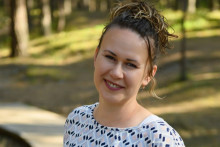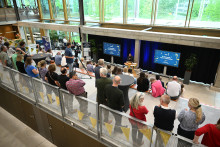Growing up in a small town near Barcelona, Gerard Martínez Görbig could literally feel the climate changing, he says. The sea getting warmer, the earth getting drier, the mountains engulfed in more and more wildfires each year. This sparked his interest in sustainability and, after a career as an architect, his decision to focus on climate action full time.
Gerard Martínez Görbig
PhD research topic: Developing regional feasibility assessments of mitigation and adaptation measures in the EU-28
Work: PhD candidate at the Department of Urban and Regional Planning and Geo-Information Management, Faculty of Geo-Information Science and Earth Observation (ITC) at the University of Twente
Education: Double master’s degree in Sustainability Science and Technology and Sustainable Intervention in the Built Environment, Universitat Politècnica de Catalunya (Spain)
Originally from: Spain
‘The ultimate goal of my research is to contribute to closing the gap between research and implementation of climate actions,’ says the PhD candidate. ‘When I worked in construction, I noticed there was a link missing between science and those who need to implement the research findings.’ He’s therefore working on a tool that local governments and policy makers can use to find and implement the most suitable climate actions.
Feasible climate actions
Martínez Görbig’s PhD research is conducted in the context of the Horizon 2020 project LOCALISED. Nine research institutions and three city councils – Barcelona, Vienna and Gdansk-Gdynia-Sopot – are working together to develop tools that will allow Europe to reach carbon neutrality by 2050. In the end of the project, every European city should have access to feasible climate actions suited to their needs.
The main part of the work of the UT scientist is focused on helping to develop a tool called Climate Action Strategiser, which will help generate plans for local cities and governments to mitigate emissions and adapt the regions to the impact of climate change. ‘My main task is to analyse the conditions of climate action implementation in Europe and to suggest the best options for the cities depending on their conditions,’ explains Martínez Görbig.
To make sure that the PhD research becomes applied in practice, Martínez Görbig has been in direct contact with municipalities from the very start. ‘I first consulted them to make sure that my work would be valuable for them. I want my research to be useful, and so I need to know what the municipalities are interested in and what specifically they need. I think we need to do that more. As scientists, we should work directly with the people that will ultimately use our research. The arena of policy making is complex, and so you can’t always think of every aspect of it. There are a lot of stakeholders you might not be aware of, and so it’s important to contact them directly – so that your research can be implemented.’
Climate (in)justice
Climate justice is another integral part of his PhD work. ‘Everyone should have equal access to the effects and benefits of climate actions,’ says Martínez Görbig. ‘In my research, I have therefore focused on the impacts on vulnerable groups. Specifically, I have looked at energy poverty – on how climate actions can unintentionally lead to energy poverty.’
For example, when we switch from fossil fuels to renewable energies or when we change our food systems, so that food production is more sustainable, this might lead to increased prices, explains the doctoral candidate. ‘For many people, this means they have to choose between paying the energy bills or paying for their groceries. Even though we can’t fully prevent these impacts, we can certainly better assess the consequences of climate actions and try to ensure that they are fair.’
This aspect is crucial, because we are already starting to see climate injustice in Europe, says the PhD researcher. ‘Especially in big cities, people can feel big economic impacts of climate actions. For instance, there is the issue of gentrification. Many neighborhoods are getting renewed, they become greener and more sustainable, and therefore a lot more expensive sometimes. Many people can’t afford to live there anymore and are displaced to worse neighborhoods again. Another example is access to water. Many regions in Southern Europe have experienced severe droughts, and access to water has become restricted – but not for everyone.’
This needs to be addressed, stresses Gerard Martínez Görbig. ‘We cannot ignore the impacts of climate change in Europe. We need to act. Climate change isn’t ending anytime soon, it’s more likely to intensify, and so we need to prepare for it – not only physically, but also by addressing the associated social issues. We need to reach climate justice in Europe as fast as possible.’








